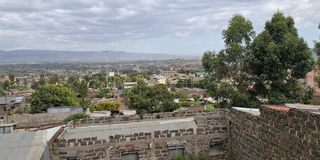How banning illicit alcohol created an alcohol-free community in Nyamarutu village

Ariel view of Nyamarutu village in Nakuru.
When I visited Nyamarutu village in Nakuru East sub-county, pupils were walking home from school. They cast curious glances at me, perhaps trying to understand my interest in their peaceful home.
My exploration of the village takes me to Nyumba Kumi chairman John Ndirangu, whose smile and warm welcome speak of a man who is proud of his home.
The village has gained popularity among locals in part due to a decision by the village leadership in 2016 to ban the brewing of illicit alcohol, effectively eliminating it from the area.

John Ndirangu, Nyumba Kumi chairman in Nyamarutu village in Nakuru.
According to Mr Ndirangu, when people are desperate for a drink, they go to the outskirts of the village to quench their thirst.
"We can't say we don't have alcoholics in our village, there are some. But when they need a drink, they go to neighbouring villages like Canyon and Mchanganyiko. There is no selling or brewing of alcohol here," says Mr Ndirangu.
Before the ban, the village faced many challenges as illicit alcohol was brewed and sold in the area.
"Three to four of our children would lose their lives every year due to the consumption of illicit alcohol. We decided to come together as a community to tackle the problem. We launched active campaigns and even reported the dens and their owners to the authorities for action," he says.
According to Mr Ndirangu, young men who had families ended up separating from their wives, education stopped and theft became rampant.
"Since we put an end to that, we've been living in peace, without any worries. Even the sudden deaths of our children have stopped," says Mr Ndirangu.
While many villages struggling with the vice find it difficult to overcome the challenge, Mr Ndirangu advises working as a team.
"Eliminating alcohol is not an easy task, and if people do not take it seriously, it will not succeed. Everyone should form a united front if they want to get rid of the vice and put everyone's self-interest before their selfish gain," he says.

Martha Waruguru, a resident in Nyamarutu village in Nakuru.
Martha Waruguru, a resident of the area, says she was evicted from her home after she appeared on television strongly condemning the vice.
"I am now a single mother because my husband saw me on the nine o'clock news saying that men have failed because of alcohol. Although I'm raising my children alone, I'm happy that the vice has been eradicated from our community. We have peace now," says Ms Waruguru.
Before the ban, she says, drinking and fighting were common in the area. People wouldn't leave their homes for fear that someone would break in and steal their belongings to sell to buy alcohol.
"As women, we were badly affected. We were left with the burden of raising children while our partners were incapacitated," says Ms Waruguru.
She reveals that she was a victim of loss after her cousin died from consuming illicit alcohol.
While there is still work to be done in other areas, the people of Nyamarutu hope that their success will inspire other villages to take similar steps to reclaim their peace and protect their children's future.

